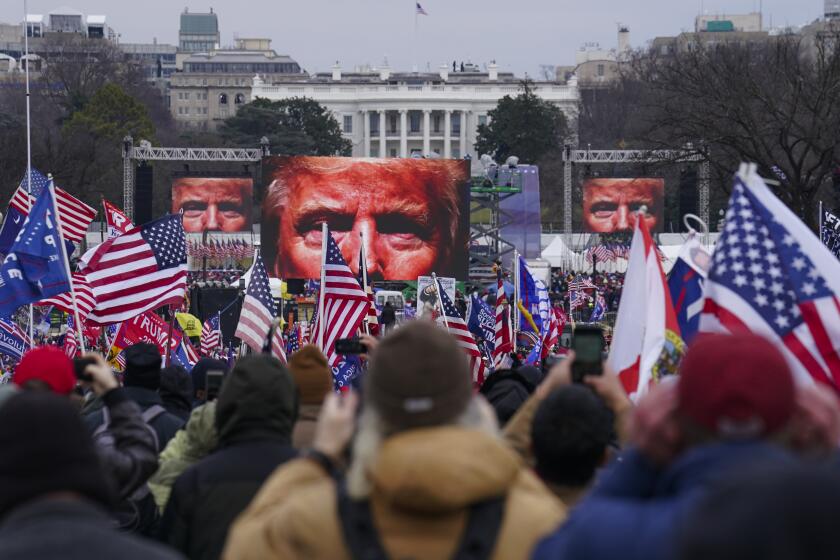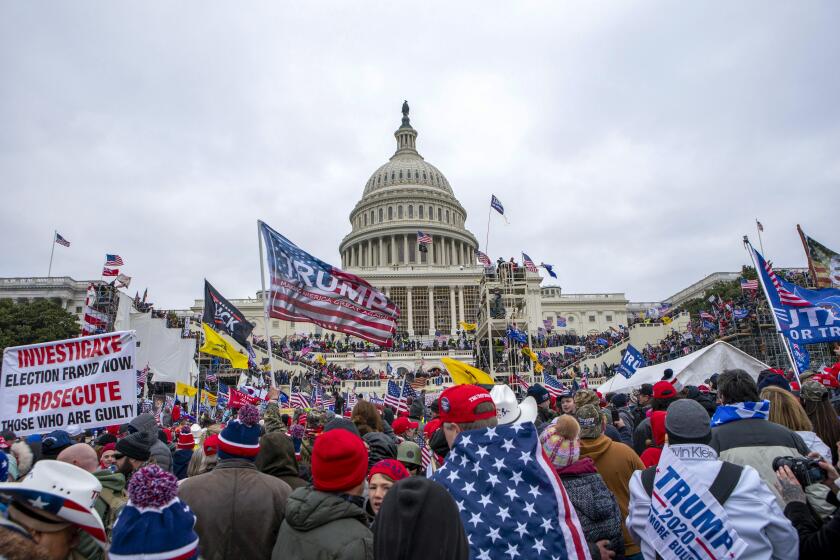This surprise argument could derail Trump’s effort to delay the Jan. 6 trial

- Share via
As all eyes watched every word filed by Donald Trump and federal prosecutors ahead of crucial oral arguments on immunity, a third party slipped in the side door with a brief that may dramatically foil the former president’s efforts to leverage the issue for maximum delay.
The watchdog organization American Oversight, which is not a party to the case, successfully petitioned the U.S. Court of Appeals for the D.C. Circuit to accept its friend-of-the-court brief on the ground that it provides a “unique perspective.”
Indeed it does. The brief makes the apparently compelling argument that the court shouldn’t be hearing this appeal at all because it lacks jurisdiction — that is, the power to consider it in the first place. If the court agrees, it would mean dismissing the appeal and returning the case to U.S. District Judge Tanya Chutkan, abruptly aborting Trump’s best opportunity to delay the federal Jan. 6 trial.
Litman: A seismic Colorado court decision just upended Trump’s campaign. Here’s what comes next
The court disqualified the ex-president from the ballot under the 14th Amendment, which bars officials who engage in insurrection from holding federal office.
Trump’s argument is that he is entitled to avoid trial because the Constitution prohibits indicting him for conduct he undertook as president, at least if it was within the “outer perimeter” of his official duties. Most observers, including me, think Trump will lose the claim on the merits, but it’s likely that the U.S. Supreme Court will have to make that pivotal determination. The question is when — before trial, putting the case on ice, or afterward.
Chutkan has decided that she can’t go forward with the trial until that’s settled, reasoning that immunity is a right not to go to trial in the first place. That suggests that even if Trump is bound to lose his claim, he will be able to string out the process for at least a couple of months, bumping back the start of probably the most important of the four criminal trials he faces. Originally scheduled for March, the trial is thereby being delayed deeper into Trump’s campaign to return to the White House.
Enter the American Oversight brief, written by lawyers with the Washington-based firm Arnold & Porter. The brief relies on a unanimous 1989 Supreme Court opinion, Midland Asphalt Corp. vs. United States, written by the late Justice Antonin Scalia. The defendant in the criminal case, Midland Asphalt, had moved unsuccessfully for a dismissal of the charges based on the prosecution’s alleged violation of grand jury rules.
Special counsel Jack Smith’s investigation yielded an indictment of the former president for his role in events surrounding the Jan. 6, 2021, Capitol riot.
The Supreme Court held that neither it nor the circuit court had the power to hear the case on “interlocutory appeal,” or before trial. As with the vast majority of issues that may arise at trial, the court ruled, this one could be considered only after a conviction.
The court emphasized that in criminal cases, the compelling interest in prompt trials demands that courts apply the interlocutory appeal doctrine “with utmost strictness.” Federal courts have jurisdiction over such appeals, the justices found, only if they are brought under a constitutional or statutory provision that expressly gives the defendant a right not to go to trial.
Since the Midland Asphalt opinion, the court has identified only three categories of motions that may be considered before trial in criminal cases: motions to reduce bail and those concerning the double jeopardy clause in the Constitution’s 5th Amendment, and the speech or debate clause, which protects legislators from being “questioned” — that is, tried — at all.
Trump’s immunity argument therefore doesn’t seem to fit within Midland Asphalt’s exceptions. It doesn’t rest on any explicit constitutional guarantee. And the D.C. Circuit Court previously held that a right based on constitutional principles such as the separation of powers doesn’t cut it.
The Justice Department and Trump had been assuming the D.C. Circuit Court has jurisdiction based on Nixon vs. Fitzgerald, which established broad but not endless immunity from lawsuits over a president’s conduct while in office. But that civil case was not subject to the “utmost strictness” standard the Supreme Court has applied to criminal trials. It also predated the Midland Asphalt opinion, which the Justice Department somewhat bafflingly failed to mention.
There may be a reason the Midland Asphalt doctrine doesn’t apply here, but I can’t think of one.
Jurisdiction is an issue that courts take extremely seriously, and I think the D.C. Circuit Court should and probably will consider the argument that it lacks jurisdiction very carefully. It’s already ordered the parties to address American Oversight’s position at oral argument Tuesday, when it’s likely to be a subject of intense questioning.
If the argument succeeds, it will be an appellate version of the sort of Perry Mason moment that rarely happens in a real courtroom. With a wave of a jurisdictional wand, Trump would be back in the district court preparing for an only slightly delayed trial.
Harry Litman is the host of the “Talking Feds” podcast. @harrylitman
More to Read
A cure for the common opinion
Get thought-provoking perspectives with our weekly newsletter.
You may occasionally receive promotional content from the Los Angeles Times.












